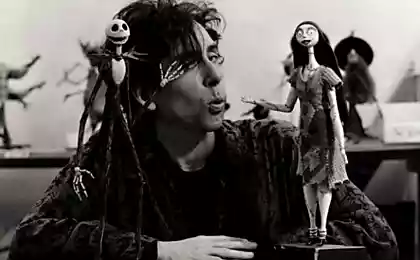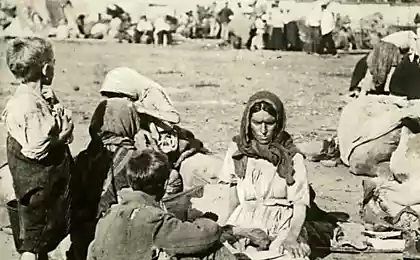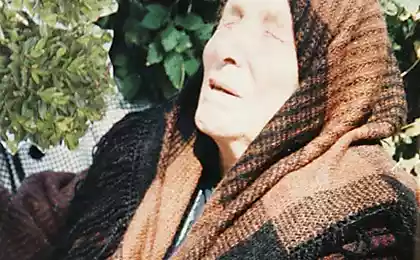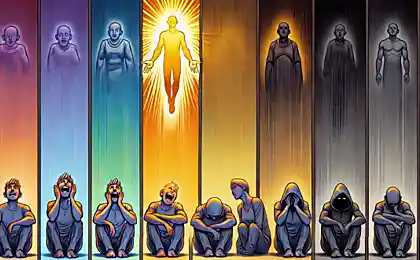520
With this you just have to live...
This conversation has given me a very hard time. I was shocked. Although the million once encountered such, but every time this kind of talk makes me sick.
A man tells me about this woman, his friend. She was in a car accident. Suddenly her life was shattered. It is almost all the time in pain, her legs paralyzed, with many a hope had to leave.

He says what a stupid, stupid she was before the incident with her unhappiness. But, he says, after the accident, her life took a change for the better. And now she lives just fine.
And finally he utters those words. Words that can be equated to the emotional, spiritual, psychological violence.
He says:"nothing happens by chance. It had happened to her. For her own spiritual, personal growth."
What a rare, vile nonsense. And this is absolutely not true.
I have many years working with people experiencing grief, and never cease to marvel at how tenacious all these myths. Vulgar, hackneyed, empty phrases masquerading as some kind of "worldly wisdom".
These myths do not allow us to do exactly what we need when our lives are suddenly turned upside down: allow yourself to grieve.
You know all these phrases. You have heard them countless times. You might and themselves spoke. And all these myths it would be nice to destroy.
And I tell you quite plainly: if your life was trouble, and someone in one form or another, says something like: "supposed to happen", "nothing is accidental", "it'll make you better", "well, it's your life, and you for everything that happens in it is responsible, and you able to fix it," you have every right to expel such adviser of its life out.
Grief is always very painful. Grief is not only when someone dies. When people break up is also sorrow. When breaking down the prospects, when you die the dream is grief. When sickness strikes – mountain.
And I repeat and repeat the words that are so strong and honest that he is able to knock down a peg every donkey devalues the mountain:
Sometimes in life many things can't be fixed. This has to just live.
It said my friend Megan devine, one of the few who writes on themes of loss and emotional turmoil so that I would have signed under her words.
These words are perceived so painfully and acutely because they hit right on target: in our vulgar, pathetic, low-grade culture, with its myths of human misery. The loss of a child is not correct. And the diagnosis of a serious illness – is not correct. And betrayal from someone you trusted more than anything – also not correct.
Such losses need to live, to bear this cross.
Although the emotional turmoil and can serve as an impetus for spiritual growth – but not always it happens. That is the reality – often it just destroys lives. And that's all.
And the trouble is that this happens because we are instead to grieve with the man – give him advice. Get off with platitudes. Are not close to those who suffered grief.
I am now living a very unusual life. I made it in a very special way. And I'm not kidding when I say that moved me the loss themselves not made me a better person. In many ways they make me rather hardened.
On the one hand, the misery and loss that I suffered made me very sensitive to pain of others. They've made me more withdrawn and secretive. I became more cynical. I have become harder to treat those who do not understand that loss do to people.
But most importantly I no longer suffer the complex of "survivor's guilt" that haunted me all my life. This complex gave rise to my secrecy, and isolation, and the vulnerability and constant self-sabotage.
My pain will never get rid of, but I've learned to use it for good – when working with others. I am so happy that I can be helpful to people in trouble. But to say that all the loss that I experienced was to happen to my abilities more fully revealed, would be to trample on the memory of those I lost, the memory of those who suffered in vain, those who are faced with the same challenges that I was young, but could not stand them.
And I'm not going to say it. I'm not going to build some crazy design to fit the life under the usual patterns. I'm not arrogant to say that God gave me life – me, not the other – so I can do what I do now. And I'm certainly not going to pretend that I was able to cope with their losses because he was strong enough that I "was successful" because "taking responsibility for your life".
How invented the most trivial banalities like this "to take responsibility for your life"! And all of this is, for the most part, nonsense...
People say this to others when you don't want these others to understand.
Because to understand is much more difficult, costly, than to give the installation seems to "be responsible for your life."
Because "personal responsibility" implies that there is something for which to be responsible. But you can't be responsible for the fact that you were raped or because you've lost a child. You are responsible for now to live in this nightmare with which you are faced. But you did not choose – whether to let the grief in his life. We're not omnipotent. When our life turns into hell when he breaks into it – we can't avoid grief.
And so all of these conventional phrases, these "settings" and "problem solving techniques" is so dangerous: confining them from those we like talking, we love, we thereby deny them the right to grief on the mountain. We deny them the right to be human. These phrases we arrest them when they are most weak, vulnerable, when they are desperate.
This one – no one! – are not allowed.

And the paradox is that in fact the only thing we are responsible when we were in trouble is for the mountain, for the accommodation of his grief.
So if someone tells you something from the "pull yourself together" or "move on", or "You can overcome" – release such a person from his life.
If someone avoids you when you have trouble, or pretends that no harm occurred, or even disappears out of your life – release it.
If someone tells you: "all is Not lost. So, this is supposed to happen. You'll be stronger having gone through this trouble" – let him go.
Let me repeat: all these words – nonsense, rubbish, lies, nonsense.
And you are not responsible for those who are trying to get their "feed". Let them go from your life. Let them go.
I'm not saying you should do it. You can decide and only you. This is an extremely difficult decision, and I have to take it very carefully. But I wanted to let you know – you have that right.
I suffered a lot of grief in life. I was filled with shame and self-hatred so strong that these feelings almost killed me.
But there were those who me in my grief helped. They were few, but they were. Was just there. Silently.
And I'm alive now because then they chose to love me. Their love was expressed in the fact that they were silent when silence was necessary. They were willing to share with me my suffering. They were willing to go through the same discomfort and anguish that I experienced. For a week, for an hour, even for a few minutes – but they were ready.
Most people have no idea how important this is.
Are there ways of "healing" when "life is broken"? Yes. Can a person go through hell, relying on them. Can. But none of this will happen if you do not give the person to otherevery, proveravati. Because it is not the grief itself – the most difficult.
The most difficult is ahead. This choice how to live. How to live with loss. How to re-fold the world and themselves from the shards. All but after people otgoreum. And there is a different way. Grief is woven into the fabric of human existence.
But our culture treats grief as a problem that needs to be solved or as a disease that should be cured – or in both senses. And we did everything to avoid, ignore mountain. And in the end, when a person is facing in his private life with the tragedy, he discovers that around people-and not some trivial "comforting" platitudes.
Something to offer in return?
When a man devastated by grief, the last thing he needs is advice.
He shattered his whole world.
And for him to invite someone in this broken world – a huge risk.
If you try something to "fix", fix it, or to rationalize his grief, or to wash away his pain – you only increase the nightmare in which man now lives.
The best thing you can do is to acknowledge his pain.
That is literally saying "I can see your pain, I acknowledge your pain. And I'm with you."
Note – I say "you", not "you". "For you" – so you're going to do something. It is not necessary. Just be there with your loved one, share in his suffering, listen to him.
There is nothing stronger in strength than it is to admit the enormity of the grief of man. And to do that, you don't need any special skills or knowledge. It only requires willingness to be near the wounded soul and to stay close – as long as you need.
To be around. Just to be around. Doesn't go away when you are not comfortable, uncomfortable or when it seems that you can't do anything. Just the opposite – when you are uncomfortable and when you think that you can't do anything – and then you have to be there.
Because in this nightmare that we so rarely dare to look – there begins the healing. Healing begins when the grieving person is another person who wants to survive this nightmare.
Every grieving on earth needs a companion.
So I beseech you, I beg you to become to somebody that person. You need more than you can imagine.
And when you are in trouble need be the person next – you will find it. I promise you that.
And the rest...well, let them go. Let them go.published
©Tim Lawrence
Also interesting: paisios of the Holy mountain: God hurts for the grief that people experience
The pain you have to live
Source: www.b17.ru/blog/25684/
A man tells me about this woman, his friend. She was in a car accident. Suddenly her life was shattered. It is almost all the time in pain, her legs paralyzed, with many a hope had to leave.

He says what a stupid, stupid she was before the incident with her unhappiness. But, he says, after the accident, her life took a change for the better. And now she lives just fine.
And finally he utters those words. Words that can be equated to the emotional, spiritual, psychological violence.
He says:"nothing happens by chance. It had happened to her. For her own spiritual, personal growth."
What a rare, vile nonsense. And this is absolutely not true.
I have many years working with people experiencing grief, and never cease to marvel at how tenacious all these myths. Vulgar, hackneyed, empty phrases masquerading as some kind of "worldly wisdom".
These myths do not allow us to do exactly what we need when our lives are suddenly turned upside down: allow yourself to grieve.
You know all these phrases. You have heard them countless times. You might and themselves spoke. And all these myths it would be nice to destroy.
And I tell you quite plainly: if your life was trouble, and someone in one form or another, says something like: "supposed to happen", "nothing is accidental", "it'll make you better", "well, it's your life, and you for everything that happens in it is responsible, and you able to fix it," you have every right to expel such adviser of its life out.
Grief is always very painful. Grief is not only when someone dies. When people break up is also sorrow. When breaking down the prospects, when you die the dream is grief. When sickness strikes – mountain.
And I repeat and repeat the words that are so strong and honest that he is able to knock down a peg every donkey devalues the mountain:
Sometimes in life many things can't be fixed. This has to just live.
It said my friend Megan devine, one of the few who writes on themes of loss and emotional turmoil so that I would have signed under her words.
These words are perceived so painfully and acutely because they hit right on target: in our vulgar, pathetic, low-grade culture, with its myths of human misery. The loss of a child is not correct. And the diagnosis of a serious illness – is not correct. And betrayal from someone you trusted more than anything – also not correct.
Such losses need to live, to bear this cross.
Although the emotional turmoil and can serve as an impetus for spiritual growth – but not always it happens. That is the reality – often it just destroys lives. And that's all.
And the trouble is that this happens because we are instead to grieve with the man – give him advice. Get off with platitudes. Are not close to those who suffered grief.
I am now living a very unusual life. I made it in a very special way. And I'm not kidding when I say that moved me the loss themselves not made me a better person. In many ways they make me rather hardened.
On the one hand, the misery and loss that I suffered made me very sensitive to pain of others. They've made me more withdrawn and secretive. I became more cynical. I have become harder to treat those who do not understand that loss do to people.
But most importantly I no longer suffer the complex of "survivor's guilt" that haunted me all my life. This complex gave rise to my secrecy, and isolation, and the vulnerability and constant self-sabotage.
My pain will never get rid of, but I've learned to use it for good – when working with others. I am so happy that I can be helpful to people in trouble. But to say that all the loss that I experienced was to happen to my abilities more fully revealed, would be to trample on the memory of those I lost, the memory of those who suffered in vain, those who are faced with the same challenges that I was young, but could not stand them.
And I'm not going to say it. I'm not going to build some crazy design to fit the life under the usual patterns. I'm not arrogant to say that God gave me life – me, not the other – so I can do what I do now. And I'm certainly not going to pretend that I was able to cope with their losses because he was strong enough that I "was successful" because "taking responsibility for your life".
How invented the most trivial banalities like this "to take responsibility for your life"! And all of this is, for the most part, nonsense...
People say this to others when you don't want these others to understand.
Because to understand is much more difficult, costly, than to give the installation seems to "be responsible for your life."
Because "personal responsibility" implies that there is something for which to be responsible. But you can't be responsible for the fact that you were raped or because you've lost a child. You are responsible for now to live in this nightmare with which you are faced. But you did not choose – whether to let the grief in his life. We're not omnipotent. When our life turns into hell when he breaks into it – we can't avoid grief.
And so all of these conventional phrases, these "settings" and "problem solving techniques" is so dangerous: confining them from those we like talking, we love, we thereby deny them the right to grief on the mountain. We deny them the right to be human. These phrases we arrest them when they are most weak, vulnerable, when they are desperate.
This one – no one! – are not allowed.

And the paradox is that in fact the only thing we are responsible when we were in trouble is for the mountain, for the accommodation of his grief.
So if someone tells you something from the "pull yourself together" or "move on", or "You can overcome" – release such a person from his life.
If someone avoids you when you have trouble, or pretends that no harm occurred, or even disappears out of your life – release it.
If someone tells you: "all is Not lost. So, this is supposed to happen. You'll be stronger having gone through this trouble" – let him go.
Let me repeat: all these words – nonsense, rubbish, lies, nonsense.
And you are not responsible for those who are trying to get their "feed". Let them go from your life. Let them go.
I'm not saying you should do it. You can decide and only you. This is an extremely difficult decision, and I have to take it very carefully. But I wanted to let you know – you have that right.
I suffered a lot of grief in life. I was filled with shame and self-hatred so strong that these feelings almost killed me.
But there were those who me in my grief helped. They were few, but they were. Was just there. Silently.
And I'm alive now because then they chose to love me. Their love was expressed in the fact that they were silent when silence was necessary. They were willing to share with me my suffering. They were willing to go through the same discomfort and anguish that I experienced. For a week, for an hour, even for a few minutes – but they were ready.
Most people have no idea how important this is.
Are there ways of "healing" when "life is broken"? Yes. Can a person go through hell, relying on them. Can. But none of this will happen if you do not give the person to otherevery, proveravati. Because it is not the grief itself – the most difficult.
The most difficult is ahead. This choice how to live. How to live with loss. How to re-fold the world and themselves from the shards. All but after people otgoreum. And there is a different way. Grief is woven into the fabric of human existence.
But our culture treats grief as a problem that needs to be solved or as a disease that should be cured – or in both senses. And we did everything to avoid, ignore mountain. And in the end, when a person is facing in his private life with the tragedy, he discovers that around people-and not some trivial "comforting" platitudes.
Something to offer in return?
When a man devastated by grief, the last thing he needs is advice.
He shattered his whole world.
And for him to invite someone in this broken world – a huge risk.
If you try something to "fix", fix it, or to rationalize his grief, or to wash away his pain – you only increase the nightmare in which man now lives.
The best thing you can do is to acknowledge his pain.
That is literally saying "I can see your pain, I acknowledge your pain. And I'm with you."
Note – I say "you", not "you". "For you" – so you're going to do something. It is not necessary. Just be there with your loved one, share in his suffering, listen to him.
There is nothing stronger in strength than it is to admit the enormity of the grief of man. And to do that, you don't need any special skills or knowledge. It only requires willingness to be near the wounded soul and to stay close – as long as you need.
To be around. Just to be around. Doesn't go away when you are not comfortable, uncomfortable or when it seems that you can't do anything. Just the opposite – when you are uncomfortable and when you think that you can't do anything – and then you have to be there.
Because in this nightmare that we so rarely dare to look – there begins the healing. Healing begins when the grieving person is another person who wants to survive this nightmare.
Every grieving on earth needs a companion.
So I beseech you, I beg you to become to somebody that person. You need more than you can imagine.
And when you are in trouble need be the person next – you will find it. I promise you that.
And the rest...well, let them go. Let them go.published
©Tim Lawrence
Also interesting: paisios of the Holy mountain: God hurts for the grief that people experience
The pain you have to live
Source: www.b17.ru/blog/25684/
How to get out of wood max: 9 ways to extend the combustion to increase heat and reduce consumption
Someone needs to finish this first























